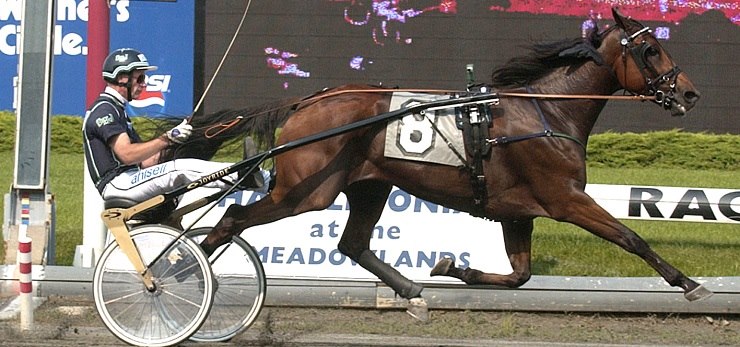Burgeoning Saturday night betting handles, booming sportsbook revenues, and the arrival of spring — along with pending relaxations of pandemic-related capacity limitations — all have Meadowlands Racetrack owner Jeff Gural feeling good about his iconic standardbred track.
But Gural also can’t help but look back at this period a decade ago, when Gov. Chris Christie nearly shuttered the track until Gural stepped in at the last minute.
A report by a key advisor to Christie in July 2010 suggested the possibility that the Big M, which opened to great fanfare in 1976, be closed to save taxpayers tens of millions of dollars in annual subsidies to keep the doors open.
“Honestly, at first I thought he was bluffing — until I got to know him,” Gural told njonlinegambling.com on Monday. “It would have been a mistake, but he was willing to make it.”
By the end of 2010, a preliminary deal was in place to have Gural take over the track from the state. But it was early spring — a decade ago — before final details such as agreements with labor unions were in place. The original deadline was April 1, 2011 — 10 years ago on Thursday.
This real estate deal was personal
Gural, 78, has amassed great wealth as CEO of real estate brokerage firm Newmark Knight Frank (and its various aliases) over the past 40-plus years, with extensive holdings in New York City as well as New Jersey.
But this transaction was unique. Gural caught the horse racing bug as a teenager at Roosevelt Raceway, and he couldn’t bear the thought of seeing the Meadowlands go under. And it wasn’t just the Meadowlands, Gural said.
“I thought that if the Meadowlands closed, that would be the end of harness racing,” Gural said recently.
He elaborated on Monday.
“There’s no question this was the No. 1 harness track in the world, and if it closed, I would have gotten out of the business — and so would have most of the big players,” said Gural, who owns horses and also operates Vernon Downs and Tioga Downs racetracks in upstate New York.
So Gural made a deal.
“If not for the emotional component, I never would have done it,” Gural said. “Truthfully, it was a terrible investment.”
Meadowlands casino next?
So has that “terrible investment” turned out to be a winner after all?”
“I think it will only be good if we get a casino here,” Gural said.
Gural again railed about what he calls New Jersey’s “stupid” idea to locate all of the state’s casinos in one place — Atlantic City. But after he bankrolled a failed referendum to end that monopoly in 2016, Gural now sees hope arising from across the Hudson River.
“I think once New York City gets casinos, we’ll get one,” Gural said, mindful of the fact that up to three casino licenses can be issued in the Big Apple region as early as December 2022. “People in New Jersey will be calling up [elected officials] and asking, ‘Why are you making me pay 18 dollars to cross the [Hudson] River?'”
Yonkers Raceway and Aqueduct, which currently are “racinos” — with thousands of slot machines but no live-dealer table games or sports betting — are the heavy favorites to snag two of the licenses.
Details on the purse increases
The Meadowlands Racetrack has announced a tiered purse increase from $500 to $2,500 across the board beginning this weekend, ensuring that the track has the highest purses in the Northeast in some cases and very competitive purses in the rest.
The goal, say track officials, is to lure some “fresh faces” to the track for the regulars to try their luck at handicapping over the next six weeks.
The added purse money stems from the $4.5 million state subsidy for 2021, another $1 million coming over from the track’s sports betting revenues, and what track officials call “the generosity of our many sponsors.”
A Meadowlands official noted that average weekend betting handle in January 2011— at the aging original grandstand that would be replaced two years later — was $2.1 million, a figure matched in February 2011.
This year, those figures for each month have jumped to $3.4 million. But as with the Atlantic City casino industry, the bottom line is not quite as strong because a higher percentage of wagering is taking place online rather than at the track.
“We get a much better percentage here,” Gural said of the racetrack. “Plus, hopefully, customers will eat and drink, too.”










